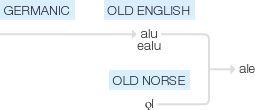Ale
Old English alu, ealu, of Germanic origin; related to Old Norse ǫl . Formerly the word referred especially to the paler varieties of beer.
wiktionary
From Middle English ale, from Old English ealu, ealo, from Proto-West Germanic *alu, from Proto-Germanic *alu (compare Dutch aal, Swedish öl), from Proto-Indo-European *h₂elut-(“beer”), or *h₂elu-(“bitter”). Compare Russian ол(ol), Lithuanian alùs, Armenian օղի(ōłi); compare also Latin alum(“ comfrey”), alūta(“ tawed leather”), Ancient Greek ἀλύδοιμος(alúdoimos, “bitter”).
etymonline
ale (n.)
"intoxicating liquor made by malt fermentation," Old English ealu "ale, beer," from Proto-Germanic *aluth- (source also of Old Saxon alo, Old Norse öl), which is of uncertain origin. Perhaps from a PIE root meaning "bitter" (source also of Latin alumen "alum"), or from PIE *alu-t "ale," from root *alu-, which has connotations of "sorcery, magic, possession, and intoxication" [Watkins]. The word was borrowed from Germanic into Lithuanian (alus) and Old Church Slavonic (olu).
In the fifteenth century, and until the seventeenth, ale stood for the unhopped fermented malt liquor which had long been the native drink of these islands. Beer was the hopped malt liquor introduced from the Low Countries in the fifteenth century and popular first of all in the towns. By the eighteenth century, however, all malt liquor was hopped and there had been a silent mutation in the meaning of the two terms. For a time the terms became synonymous, in fact, but local habits of nomenclature still continued to perpetuate what had been a real difference: 'beer' was the malt liquor which tended to be found in towns, 'ale' was the term in general use in the country districts. [Peter Mathias, "The Brewing Industry in England," Cambridge University Press, 1959]
Meaning "festival or merry-meeting at which much ale was drunk" was in Old English (see bridal).
